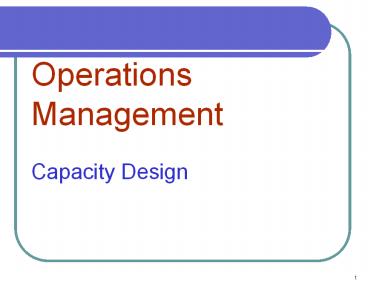Operations Management Capacity Design - PowerPoint PPT Presentation
Title:
Operations Management Capacity Design
Description:
Title: Operations Management Capacity Design Author: bibhor Last modified by: bunty Created Date: 4/9/1998 1:23:40 AM Document presentation format – PowerPoint PPT presentation
Number of Views:94
Avg rating:3.0/5.0
Title: Operations Management Capacity Design
1
Operations ManagementCapacity Design
2
Types of Planning Over a Time Horizon
3
Definition and Measures of Capacity
Design Capacity
The maximum throughput, or number of units a
facility can produce in a period of time.
Capacity a firm can expect to achieve given its
product mix, methods of scheduling, maintenance,
and standards of quality.
Effective capacity
Utilization
Actual output as a percent of design capacity.
Efficiency
Actual output as a percent of effective capacity.
4
Utilization
- Measure of planned or actual capacity usage of a
facility, work center, or machine
Actual Output
Utilization
Design Capacity
5
Efficiency
- Measure of how well a facility or machine is
performing when used
Actual output
Efficiency
Effective Capacity
6
Example
- Facility produces breakfast rolls
- Last week, produced 148,000 rolls
- Effective capacity is 175,000 rolls
- Line operates 7 days a week with three 8-hour
shifts per day - Line designed to produce 1200 rolls per hour
- Determine
- Design Capacity
- Utilization
- Efficiency
7
Calculating actual output
- Same facility adding one more line due to
increase in demand for deluxe rolls - Effective capacity is 175,000 rolls of this line
- Efficiency of this second line will be 75
- What is the expected output?
8
Managing Demand
- Demand exceeds capacity curtail demand by
raising prices, scheduling long lead times, etc - Capacity exceeds demand stimulate demand
through price reductions, aggressive marketing,
etc - Adjusting to seasonal demands offer products
with complementary demand patterns pdts for
which demand is high for one when low for the
other
9
Managing Capacity
- Making staffing changes (increasing or decreasing
the number of employees) - Adjusting equipment and processes which might
include purchasing additional machinery or
selling or leasing out existing equipment - Improving methods to increase throughput and/or
- Redesigning the product to facilitate more
throughput
10
Breakeven Analysis
- Technique for evaluating process equipment
alternatives - Objective Find the point ( or units) at which
total cost equals total revenue - Assumptions
- Revenue costs are related linearly to volume
- All information is known with certainty
11
Break-Even Analysis
- Fixed costs costs that continue even if no
units are produced depreciation, taxes, debt,
mortgage payments, salaries, etc - Variable costs costs that vary with the volume
of units produced labor wages, materials,
portion of utilities
12
Breakeven Chart
Total revenue line
Profit
Breakeven point Total cost Total revenue
Profit
Total cost line
Cost in Dollars
Variable cost
Loss
Fixed cost
Volume (units/period)
13
Crossover Chart
14
Break Even Contd..
- BEPx FC (units)
- P-V
- BEPrs. FC (amount)
- 1-(V/P)
- BEPrs. FC (multi
product) - ?(1-Vi/Pi)(Wi)
- PSelling price, Vvariable cost
- FCfixed cost
15
BEP Calc.
- A company has fixed costs of 10000/- this period.
Direct costs are 1.5/- per unit and material cost
is 0.75/- per unit. The selling price is 4/- per
unit. Calculate the BEPs.
16
BEP Calc. in multi product case
ITEM PRICE COST FORECASTED SALES ANNUALLY
Sandwich 2.95 1.25 7000
Cola 0.80 0.30 7000
Burger 1.55 0.47 5000
Tea .75 0.25 5000
Salad 2.85 1.00 3000
17
Item P V V/P 1-(V/P) Forecasted sales of sales wghtd.contribution
Forecasted sales of sales wghtd.contribution
sandwich 2.95 1.25 .42 .58 20650 .446 .259
Cola 0.80 .30 .38 .62 5600 .121 .075
Burger 1.55 .47 .30 .70 7750 .167 .117
Tea 0.75 .25 .33 .67 3750 .081 .054
Salad 2.85 1.0 .35 .65 8550 .185 .120
46300 1.00 .625
18
- If the fixed costs are 3500,
- BEPrs. FC
?(1-Vi/Pi)(Wi) - 350012 67200
- 0.625
19
Decision trees application
- A company is considering capacity expansion. it
has 3 alternatives. the new facility would
produce new type of product and currently the
marketability of the product is unknown. - Types of plant favorable mkt. unfavorable
mkt. - Large plant 100 k -90k
- Medium plant 60k -10k
- Small plant 40k -5k
- The probability of fav and unfav. Markets are 0.4
and 0.6 respectively.
20
- EMV (large plant)0.4(100k)(.6)(-90k)-14k
- EMV (medium plant)0.4(60k)(.6)(-10k)18k
- EMV (small plant)0.4(40k)(.6)(-5k)13k
- Based on Expected market value, the company
should build a medium plant
21
Net Present value
- A co. having two capacity expansion alternatives
A and B have useful lives of 4 years. Initial
outlay for A is 25k and that for B is 26k. The
cost of capital is 8.the cash flow pattern is as
follows. - year A B
- 1 10k 9k
- 2 9k 9k
- 3 8k 9k
- 4 7k 9k































